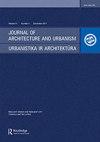THE ROLE OF VISUAL PREFERENCES IN ARCHITECTURE VIEWS
IF 0.8
0 ARCHITECTURE
引用次数: 2
Abstract
Since the biggest part of the human relationship with environments occurs through visual sense, the interests and wills of humans in seeing environment and architecture are important. In fact, these interests give personal or individual aspects of architecture. The role of these visual interests and mental judgments of architecture audience is very important, such that architecture has become a function of the visual preferences of the audience. Therefore, realizing these preferences is important to form architecture and ignoring them results in not providing the desired architecture condition for the audience or the required motivations for producing useful mental images to meet the basic needs of the audience. Accordingly, this study addresses the role of visual preferences in the formation of environment architecture? And which factors in this environment affect this concept? Thus, this study aims to describe the visual preferences paradigm in architecture in order to examine its different aspects in relation to human and environmental behaviors and determine the effective factors, so This study was conducted using Bourdieu’s “distinction theory” and the nature of sensory judgment with the help of field studies and descriptive analysis a number of audiences of 62 different residential environments. As a result of this research, natural, memorable, evocative environments along with the combination of open and closed spaces have shown the most visual preferences of the person towards architecture that the mental images of the person with cultural roots have been very effective in judging architecture views.视觉偏好在建筑视图中的作用
由于人类与环境的大部分关系是通过视觉发生的,因此人类在观看环境和建筑时的兴趣和意愿是很重要的。事实上,这些兴趣给建筑带来了个人或个人的方面。建筑观众的这些视觉兴趣和心理判断的作用是非常重要的,使得建筑成为了观众视觉偏好的函数。因此,意识到这些偏好对于形成建筑是很重要的,忽视它们会导致不能为观众提供所需的建筑条件,或者产生有用的心理图像以满足观众的基本需求所需的动机。因此,本研究探讨了视觉偏好在环境建筑形成中的作用。在这种环境中,哪些因素影响了这个概念?因此,本研究旨在描述建筑中的视觉偏好范式,以考察其与人类和环境行为相关的不同方面,并确定影响因素,因此本研究采用布迪厄的“区分理论”和感官判断的本质,通过实地研究和描述性分析,对62个不同居住环境的一些观众进行了研究。通过这项研究,自然的、令人难忘的、令人回味的环境以及开放和封闭空间的结合显示了人们对建筑的最大视觉偏好,具有文化根源的人的心理形象在判断建筑观点方面非常有效。
本文章由计算机程序翻译,如有差异,请以英文原文为准。
求助全文
约1分钟内获得全文
求助全文
来源期刊

Journal of Architecture and Urbanism
ARCHITECTURE-
CiteScore
1.30
自引率
14.30%
发文量
12
审稿时长
15 weeks
期刊介绍:
The Journal of Architecture and Urbanism publishes original research on all aspects of urban architecture.
 求助内容:
求助内容: 应助结果提醒方式:
应助结果提醒方式:


